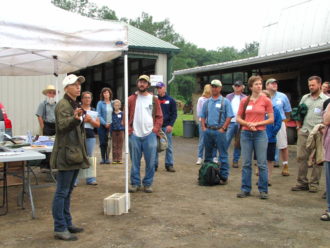The media—both traditional print, television and radio outlets as well as social media—can be a great tool for sharing the innovative techniques and concepts that are at the core of your field day. Following a few simple tips can help get the most out of the media's interest in your field day. Offering a reporter a good story can turn you into a source for future coverage of the topic.
Traditional Media
- Identify local television and radio stations, and newspapers. Remember to include weekly papers, community cable stations and local colleges.
- Determine whom at each outlet should be sent a press release, PSA or calendar item. Include both your email address and cell phone number. Be accessible. See samples.
- Create a calendar with each outlet’s deadlines. This will help with the timing of press release delivery as the event nears.
- Do not send a press release at the last minute. Send it by their deadline, or preferably about two weeks in advance. (See the Creating Press Releases and PSAs section.)
- Follow up promptly if an outlet contacts you.
- The press release and personal contact should include an invitation to reporters to attend, not just a promotion of the event. Allow members of the media to attend for free.
- Be prepared to be interviewed, photographed and video recorded. (See Interview Tips on this page.)
- Have good photos of the site ready to provide, if requested. If you take photos, make sure your phone or camera is set to take high-resolution images, which is needed for an image to appear in print.
- Encourage any reporters who attend the event to contact you if they have follow-up questions or need details clarified. However, do not insist they share their story with you before it runs.
- Thank anyone who writes about the event.
Social Media
- Use the farm’s or ranch’s existing website, Facebook page, Twitter account, blog or e-newsletter for promotion. Invite followers to the event.
- Create a Twitter hashtag that is relevant, unique and short.
- Post regularly, with photos.
- Ask others involved in the planning to post to their social media sites and e-newsletters.
Interview Tips
Taking some time to think about and craft your key messages in a way that appeals to non-agricultural reporters can go a long way toward ensuring meaningful coverage. Note that these tips relate specifically to one-on-one interviews, not necessarily when speaking to your field day audience.
- Remember that a reporter's audience is typically the general public. So first and foremost, you should be able to explain why the practices or research you are discussing at your field day are meaningful to the non-agricultural community. Tying your story to local environmental, economic or regulatory issues that affect the whole farming community or general public will make it more relevant.
- Identify your top three messages ahead of time, and be prepared to explain them briefly. This is especially helpful for radio and television interviews, since those stories are often very short. What are you doing on your farm and why is it important to other farmers and the community at large? Do not memorize a script, but be prepared to deliver a concise, meaningful message.
- Do not assume a reporter has knowledge about farming just because they want to cover the event. Most reporters are generalists who cover diverse topics on a day-to-day basis, and they do not have time to delve into the background of your profession. Ask them if they need you to explain particular concepts.
- Minimize your use of agricultural jargon, slang, technical terms and acronyms. Or, explain those terms that are important to use.
- If you offer your handouts, research data and other materials to reporters, be prepared to summarize the key points from such information. This makes the reporter's job easier and minimizes the chance of an error appearing in the story.
- Talk slowly and clearly when giving an interview, especially when a reporter is taking hand-written notes. The faster you talk, the more likely it is they will miss important details or get something wrong.
- It is okay to pause and think before answering a question. And stop talking when you feel you have given a complete answer. There is no need to keep talking just to fill silence—that is the time for the reporter to ask another question.
- You want to get reporters' attention and share the importance of what you are doing, but be careful not to exaggerate or lie, since your reputation could be at stake. If you do not know the answer to an interview question, simply admit to it and do not try to guess. It is better to direct the reporter to a technical expert in attendance than say something that others know is wrong.
- Anything you say to a reporter is fair game for a story, so if you do not want something reported, do not say it. Of course, due to the uncontroversial nature of an agricultural field day, you are not likely to have a difficult experience with a reporter who has taken the time to cover your event.
